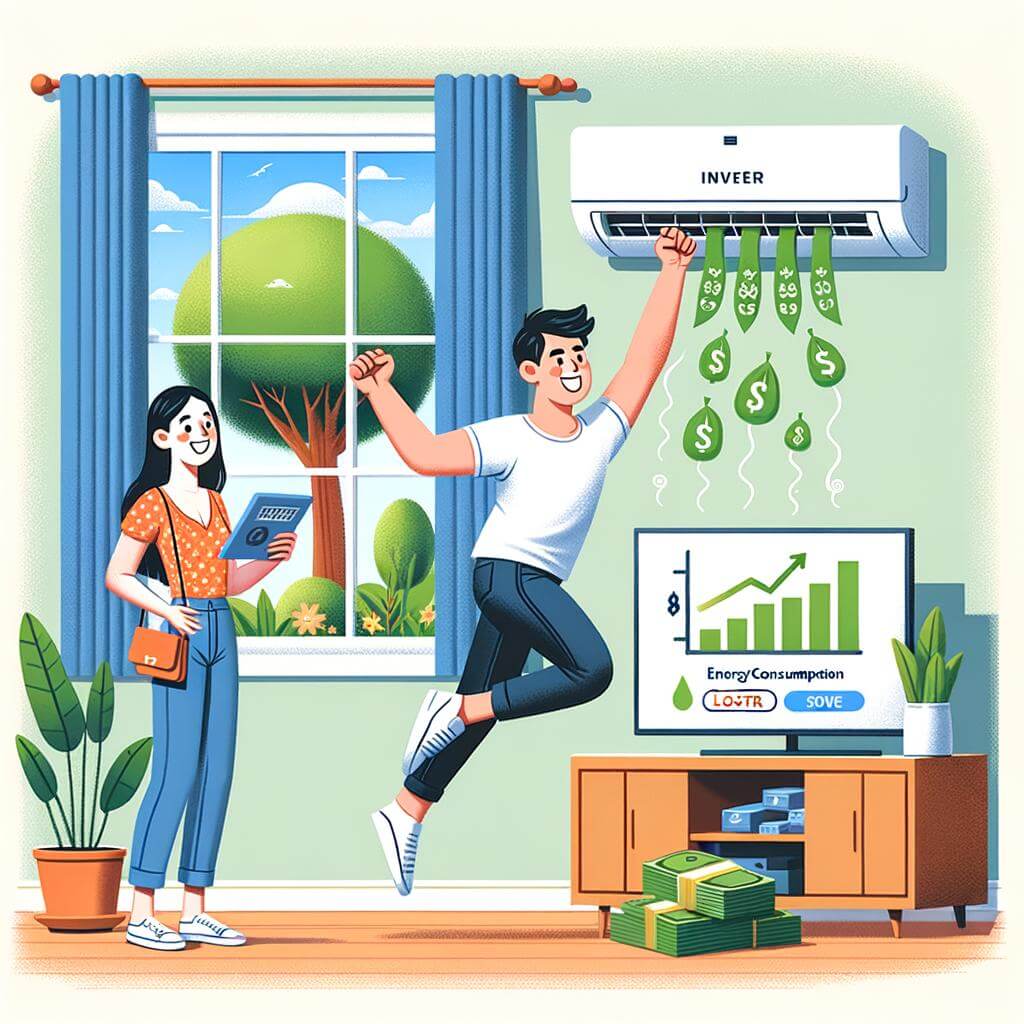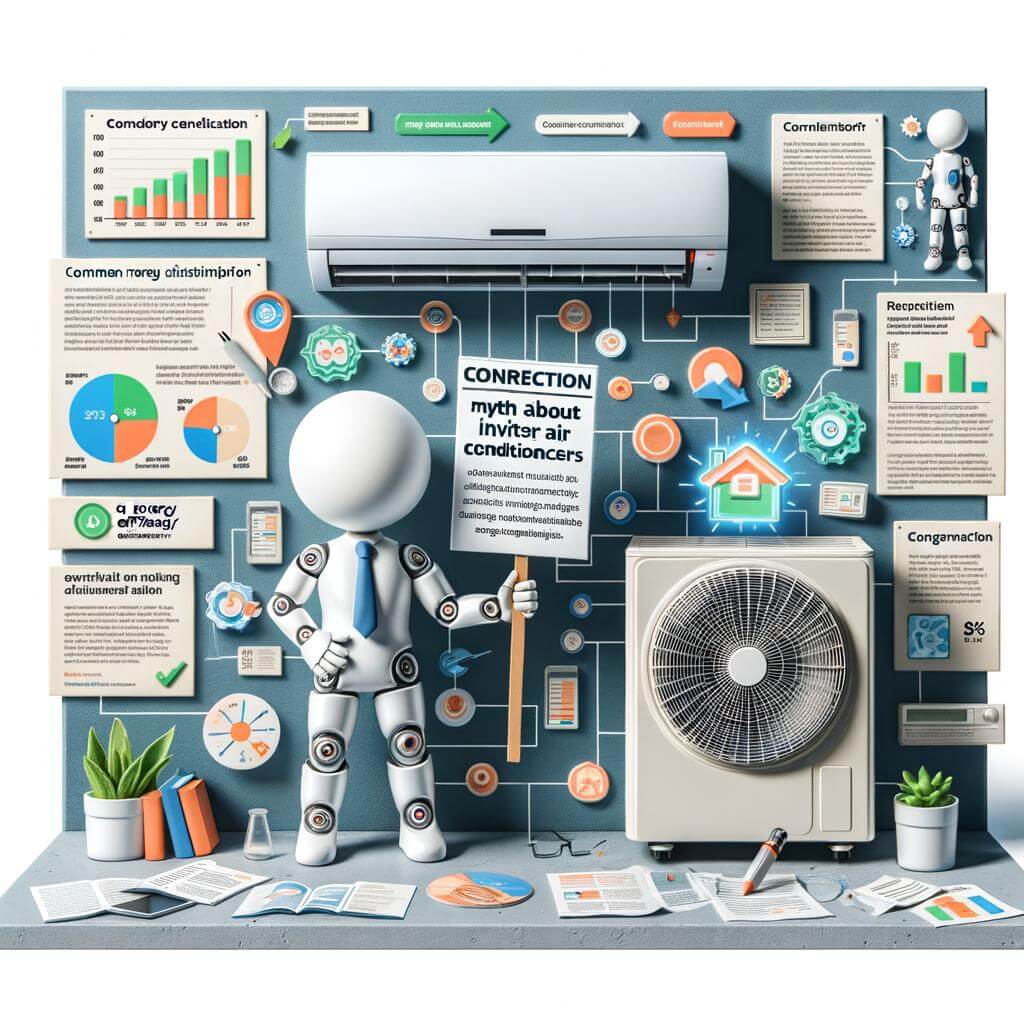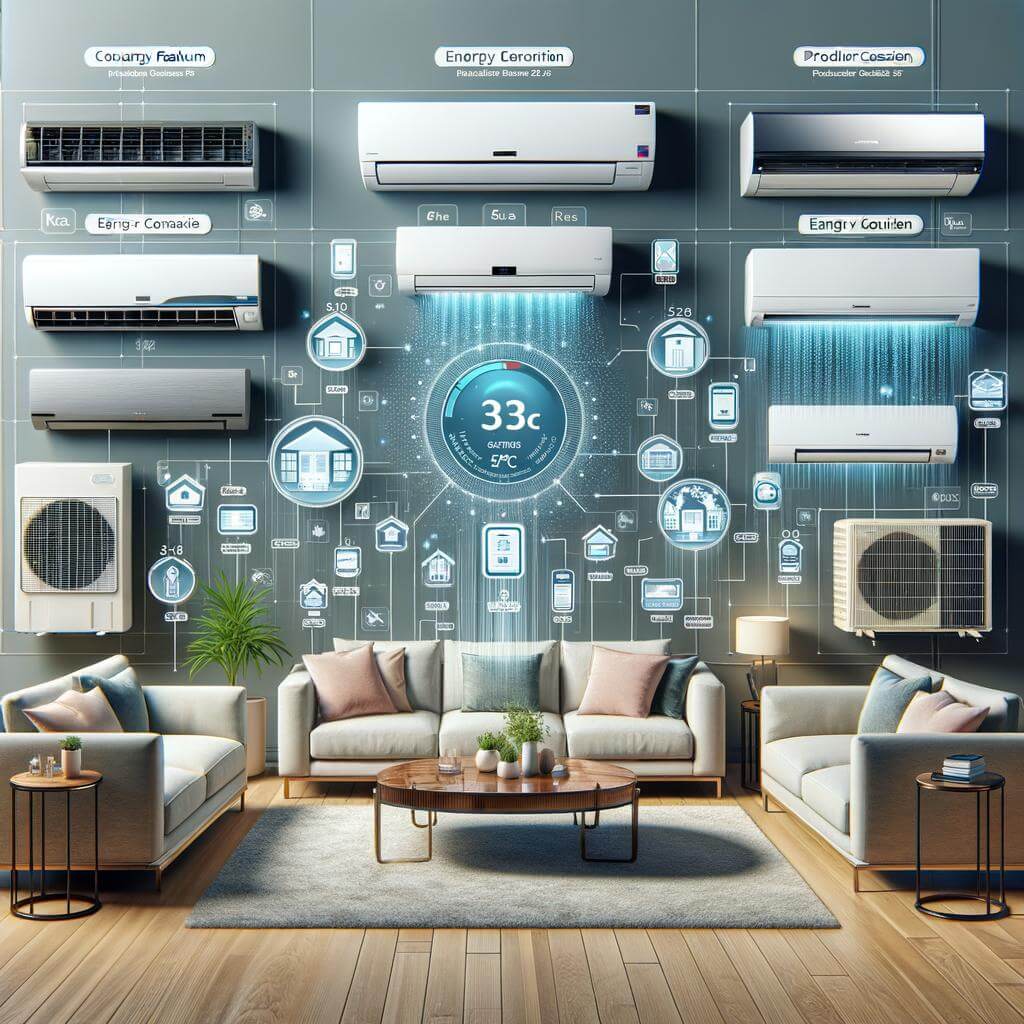Welcome everyone! Today, we are going to delve into an increasingly popular topic, ‘What is an Inverter Air Conditioner for Homes’. This educational post is intended to answer those burning questions you might have about inverter air conditioning technology, and particularly, what it could mean for your home. As industry experts, we’ll provide you reliable, fact-based information on this subject, promising to make this article both enlightening and simple to comprehend. We aim to illustrate how an inverter air conditioner could enhance the comfort of your home environment while also proving to be an energy-efficient and cost-effective choice. Let’s get started and help you make an investment that benefits you in numerous ways!
Understanding the Basics of an Inverter Air Conditioner
In the world of home comfort, Inverter Air Conditioners have become a game changer. Unlike traditional air conditioning systems that cycle on and off, an inverter air conditioner operates in a different manner. It utilizes a variable-speed compressor to regulate the cooling and heating capacity according to the current temperature of the room. This revolutionary technology ensures better temperature consistency, superior energy efficiency and reduced operational noise level.
An essential feature of this powerful system is its Intelligent Inverter Technology. Rather than shutting off and on in response to room temperature changes, this technology allows the system to control its speed capacity. Let’s break down its key benefits:
- Maintaining consistent temperature: By running constantly, inverter air conditioners can monitor and adjust the room temperature to the desired level with almost no noticeable fluctuations, providing a consistent comfort experience.
- Efficient energy use: By adjusting the speed of the compressor to maintain the set temperature, inverter air conditioners consume less power compared to traditional ones that turn on and off completely, leading to significant energy savings.
- Quiet operation: Unlike conventional models that create noticeable noise when starting and stopping, the gradual change in the speed of inverter units mitigates the abrupt noises, ensuring a quieter and more peaceful indoor environment.
Having grasped these basics, it’s easier to understand why inverter air conditioners are particularly recommended for locations experiencing frequent temperature fluctuations or for those who value energy efficiency and quiet operation.
| Traditional Air Conditioners | Turns On/Off Completely | Noisy | Higher Power Consumption |
| Inverter Air Conditioners | Adjusts Speed | Quieter | Lower Power Consumption |

How Inverter Air Conditioners Operate: A Technical Dive
Inverter air conditioners function on a unique principle of changing the frequency of the power supply, which is directly related to the compressor’s speed. This innovative technology allows them to adjust the cooling and heating power to suit your living spaces and personal comfort preferences. The one main advantage of the “Variable Speed” feature is that it works to maintain a steady temperature, and hence, tends to be highly efficient, thus conserving energy and reducing costs.
When power is fed to the air conditioner, it passes through an inverter circuit composed of a rectifier and a capacitor. The rectifier converts AC power into DC power, which charges the capacitor. In turn, the capacitor discharges that energy to the compressor in the form of modified sine waves. Let’s break down this operation:
- Input Stage: The AC voltage from the power grid enters the air conditioner.
- Rectification: The rectifier converts AC to DC voltage.
- Smoothing: The capacitor smoothens the fluctuation in the voltage generated by the rectification process.
- Inversion: The DC voltage is now converted back into AC voltage but in the form of a modified sine wave.
- Output Stage: The modified wave controls the speed of the compressor motor, which directly influences the cooling and heating capacity of the air conditioner.
The whole process contributes to the device’s ability to maintain a constant temperature and avoid known energy-consuming start-and-stop cycles in conventional air conditioners. It eliminates power surges and provides optimal temperature control. That’s why the inverter air conditioner is a smart choice for homes, promising not only comfort and efficiency but also considerable savings.

Benefits of Switching to an Inverter Air Conditioner for Homes
As we become more conscious about energy efficiency and environmental friendliness, many homeowners are making a switch to inverter air conditioners. This latest technology in cooling not only assures a significant cut on your energy consumption but also offers a list of other refreshing advantages. Firstly, the peak efficiency of inverter air conditioners sets them apart from the rest. While traditional air conditioners operate at full power or not at all, inverters can adjust their power. This results in controlled and consistent temperature, preventing an energy-draining cycle of on-and-off cooling. Additionally, it enhances comfort as the temperature fluctuations experienced with conventional units are avoided.
Less Energy Consumption: Due to its variable compressor speed, inverter air conditioners consume up to 50% less energy compared to traditional ACs. This not only reduces your electricity bills but also contributes to energy conservation.Quieter Operation: The fluctuating speed of the compressor also results in decreased noise. It eliminates the start-up and shut-down sounds that non-inverter units typically make, ensuring a peaceful environment.Longer Lifespan:Since inverter air conditioners work optimally, not maximum, at all times, there’s less wear and tear on your system. This prolongs the lifespan of your AC, reducing replacement and maintenance costs.
Moreover, for temperature-sensitive individuals, inverter air conditioners can be a blessing. Their advanced technology ensures a steady indoor climate, which can protect you against sudden changes in the weather.
| Setup | Sudden Weather Change Impact |
|---|---|
| Traditional AC | More prone to sudden temperature changes, less comfortable. |
| Inverter AC | Less prone, maintains a comfortable and steady temperature. |
Regardless of the initial cost, switching to an inverter air conditioner can be a wise investment in the long run – a small step toward a greener world, and a giant leap towards a more comfortable living space.
Debunking Common Myths About Inverter Air Conditioners
Myth 1: Inverter Air Conditioners are Much More Expensive
Inverter air conditioners might seem to have a higher up-front cost, but they can prove to be a cost-effective investment in the long run. These units can save up to 30%-50% of electricity compared to non-inverter types, leading to substantial savings on energy bills over time. This is essentially because they regulate the speed of the compressor to control the refrigerant flow, thereby using less power. Moreover, inverter air conditioners also tend to have a longer lifecycle, which adds to their cost savings. It’s important to consider these factors when evaluating the cost of an inverter AC.
Myth 2: Inverter Air Conditioners are Unnecessary for Small Homes
Size is not the sole determinant for the need for an inverter air conditioner. These air conditioners are known for their efficient and effective cooling capabilities, irrespective of the size of the home. An inverter air conditioner can efficiently cool a small area by smartly adjusting its cooling capacity in response to the heat load in the room. Regardless of your home’s size, if energy efficiency, cooling performance, noise control, and long-term cost saving are significant factors for you, an inverter AC might be the right choice.
Myth 3: Inverter Air Conditioners Need More Maintenance
In actuality, inverter air conditioners require the same amount of maintenance as conventional air conditioners. Regular servicing and cleaning of filters will not only keep your AC in good shape but also enhance its lifespan. So, this myth can be outrightly disregarded. Despite the myths, it’s clear that inverter air conditioners are an excellent choice, offering comfortable cooling and significant energy savings in the long run.
Pros and Cons: An Objective Analysis of Inverter Air Conditioners
Inverter air conditioners have gained in popularity in recent years due to their energy-saving potential. The fundamental difference between an inverter and a non-inverter air conditioner is the way the compressor in the unit operates. In a non-inverter air conditioner, the compressor operates at full capacity until the desired temperature is reached and then switches off. This cycle repeats, leading to fluctuations in room temperature and higher energy consumption. On the other hand, an inverter air conditioner adjusts the speed of the compressor to maintain a constant room temperature, leading to significant energy savings.
However, like any appliance, there are pros and cons to consider. Pros include:
- Energy Efficiency: Inverter air conditioners are up to 50% more energy-efficient than traditional air conditioners.
- Quiet Operation: Since the compressor doesn’t turn on and off but instead operates at varying speeds, it’s much quieter.
- Precise Temperature Control: With non-stop operation, these units provide a more stable room temperature.
Though the advantages are plentiful, we also need to consider the Cons:
- High Initial Cost: Inverter air conditioners are more expensive initially than traditional units.
- Maintenance: These types of air conditioners can be pricier to repair due to the complicated technology involved.
Here’s a quick table summarizing the pros and cons:
| Pros | Cons |
|---|---|
| Energy Efficiency | High Initial Cost |
| Quiet Operation | Costlier to Repair |
| Precise Temperature Control |
In conclusion, the choice between an inverter air conditioner and a traditional unit typically comes down to a trade-off between initial cost and long-term energy savings. It’s important to understand your specific needs and budget before deciding which one is right for you.

Specific Recommendations: Choosing the Best Inverter Air Conditioner for Your Home
When stepping into the market for purchasing an Inverter Air Conditioner, there are a few crucial aspects that you need to consider. The first of them is the capacity of the air conditioner. You need to assess the cooling requirements of your room before settling for a certain capacity. It is recommended to go for a higher capacity for larger rooms and lower capacity for smaller rooms. Secondly, the energy efficiency is a crucial aspect. With increasing electricity prices, buying an energy-efficient model is more of a necessity than a choice.
When settling on a particular model, make sure to check out its noise levels. A quiet operation is an added advantage. Next, inspect the cooling speed of the unit. Most inverter air conditioners come with adjustable speed settings that allow you to control the cooling rate. Lastly, pay attention to the installation requirements of the air conditioner. If the installation process is complex, look for a model that offers professional installation.
- Capacity of the Air Conditioner
- Energy Efficiency
- Noise Levels
- Cooling Speed
- Installation Requirements
| Capacity | Energy Efficiency | Noise Levels | Cooling Speed | Installation Requirements |
|---|---|---|---|---|
| Depends on room size | Energy star rating | Measured in decibels | Adjustable settings | Complexity varies |

Making Your Decision: Should You Invest in an Inverter Air Conditioner
An inverter air conditioner is a modern, energy-efficient cooling solution that varies the speed of the compressor motor to maintain the desired temperature. Unlike regular air conditioning units, inverter air conditioners avoid the constant switching on and off, ensuring that the unit operates more efficiently and quietly. However, before investing in an inverter air conditioner, certain considerations should be factored into your decision.
Factors to Consider before Investing
Primarily, cost is a significant factor. Inverter air conditioners may initially be more expensive than non-inverter counterparts. It’s vital to calculate the potential energy savings in the long run to see if the cost is justified.
Check the size and capacity needed for your home. A unit that is too large will cycle on and off too often, lowering its efficiency. On the other hand, a unit that is too small will constantly run at maximum capacity, leading to higher energy costs.
Another crucial factor to consider is the reliability of the brand. Opt for a reputable and trusted brand, and do not forget to check the warranty offered. Also, weigh the availability of service and maintenance in your area.
| Factor | Consideration |
|---|---|
| Cost | Calculate potential energy savings |
| Size & Capacity | Match to the requirements of your home |
| Brand Reliability | Choose a reputable and trusted brand |
| Service and Maintenance | Assure availability in your area |
An inverter air conditioner can be a smart choice for comfort and energy savings. Remember, taking the time to make an informed decision helps ensure you get the most out of your investment.
The Way Forward
As we wrap up, let’s recall that an inverter air conditioner for homes is a significant departure from traditional air conditioners. Its capabilities rest on a technology that reduces power consumption, enhances efficiency, and maintains a comfortable and consistent temperature – a true game changer. Given its long-term financial benefits and comforting environmental effects, it is an excellent option for stellar home cooling solutions. Investigating for the best-suited inverter air conditioner for your house might seem like a stressful task, but the rewards are more than worth it. Remember, charge your choice with information, your pocket will thank you and so will Mother Earth! Stay tuned for more expert insights on home essentials. Your comfort is our commitment!




